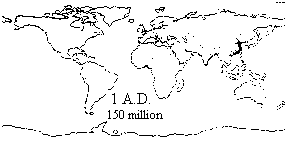 The world population is growing at an alarming rate. There are about 3 Billion more people on the planet now than when Neil Armstrong stepped foot on the Moon. We must find a way to tread more lightly on the planet and slow our growth or we will be our own worst enemy. The result of non-action, there will be blood.
The world population is growing at an alarming rate. There are about 3 Billion more people on the planet now than when Neil Armstrong stepped foot on the Moon. We must find a way to tread more lightly on the planet and slow our growth or we will be our own worst enemy. The result of non-action, there will be blood.
So what can you do about it?
Paul Ehrlich, author of The Population Bomb in 1968 and more recently The Dominant Animal, is coming to Portland to discuss the issue.
Below text from various sources in the links:
Links:
More on Ehrlich's new book
And his Island Press blog
Paul Ehrlich helped ignite the modern environmental movement with The Population Bomb in 1968. Paul and his wife Anne are back with a new book,The Dominant Animal, which takes a new look at our future on the planet as evidence mounts that the population bomb may have gone off.
The 40-year anniversary of The Population Bomb and the publication of The Dominant Animal provide a great opportunity for an in-depth look at Paul Ehrlich’s original warning to the world in 1968, his legacy, and his continuing work to understand and explain the crisis facing our civilization.
The 40-year anniversary of The Population Bomb and the publication of The Dominant Animal provide a great opportunity for an in-depth look at Paul Ehrlich’s original warning to the world in 1968, his legacy, and his continuing work to understand and explain the crisis facing our civilization.
Paul Ehrlich in Portland
Illahee hosts Paul Ehrlich to talk about his new book, co-authored with Anne Ehrlich: "The Dominant Animal: Human Evolution and the Environment"When: 7:30 p.m., Dec. 3
Where: First Congregational Church, 1126 SW Park Ave., Portland
Cost: Free
Links:
More on Ehrlich's new book
And his Island Press blog





Rampant population growth threatens our economy and quality of life. I'm not talking just about the obvious problems that we see in the news - growing dependence on foreign oil, carbon emissions, soaring commodity prices, environmental degradation, etc. I'm talking about the effect upon rising unemployment and poverty in America.
ReplyDeleteI should introduce myself. I am the author of a book titled "Five Short Blasts: A New Economic Theory Exposes The Fatal Flaw in Globalization and Its Consequences for America." To make a long story short, my theory is that, as population density rises beyond some optimum level, per capita consumption of products begins to decline out of the need to conserve space. People who live in crowded conditions simply don’t have enough space to use and store many products. This declining per capita consumption, in the face of rising productivity (per capita output, which always rises), inevitably yields rising unemployment and poverty.
This theory has huge implications for U.S. policy toward population management. Our policies that encourage high rates of population growth are rooted in the belief of economists that population growth is a good thing, fueling economic growth. Through most of human history, the interests of the common good and business (corporations) were both well-served by continuing population growth. For the common good, we needed more workers to man our factories, producing the goods needed for a high standard of living. This population growth translated into sales volume growth for corporations. Both were happy.
But, once an optimum population density is breached, their interests diverge. It is in the best interest of the common good to stabilize the population, avoiding an erosion of our quality of life through high unemployment and poverty. However, it is still in the interest of corporations to fuel population growth because, even though per capita consumption goes into decline, total consumption still increases. We now find ourselves in the position of having corporations and economists influencing public policy in a direction that is not in the best interest of the common good.
The U.N. ranks the U.S. with eight third world countries - India, Pakistan, Nigeria, Democratic Republic of Congo, Bangladesh, Uganda, Ethiopia and China - as accounting for fully half of the world’s population growth by 2050.
If you’re interested in learning more about this important new economic theory, I invite you to visit my web site at OpenWindowPublishingCo.com where you can read the preface, join in my blog discussion and, of course, purchase the book if you like. (It's also available at Amazon.com.)
Please forgive the somewhat spammish nature of the previous paragraph. I just don't know how else to inject this new perspective into the overpopulation debate without drawing attention to the book that explains the theory.
Pete Murphy
Author, "Five Short Blasts"